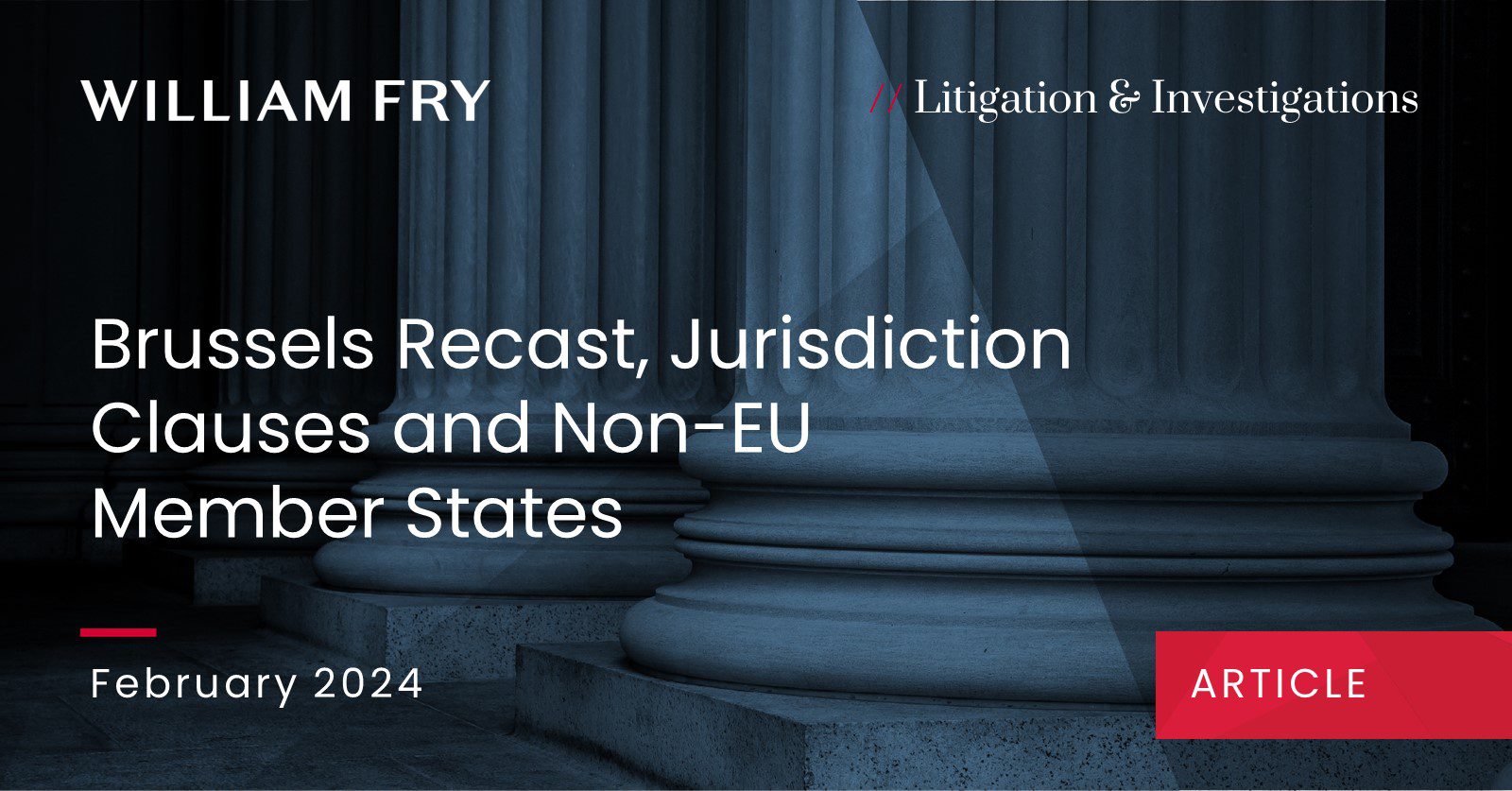William Fry recently acted for the first named defendant TechAds Media Limited (TechAds) in successfully challenging the jurisdiction of the Irish courts to hear a contractual dispute against it.
Monetizead DOO v Techads Media Limited and Scugnizerria Consulting Limited [2024] IEHC 44
TechAds and the second-named defendant Scugnizerria Consulting Limited (SCL) challenged the jurisdiction of the Irish courts to hear the plaintiff’s claims against them relating to two separate agreements. Techads and SCL are Irish-registered companies and domiciled in Ireland for the purposes of Article 4 of Regulation 1215/2012 (Brussels Recast). Article 4 sets out the general rule that a defendant must be sued in the courts of the country where it is domiciled. Where the defendant is a company, domicile means the place where it has its registered office or its place of incorporation. Article 25 provides an exception to the general rule, allowing the parties to submit to the jurisdiction of the courts of EU member states through exclusive jurisdiction clauses.
However, Techads and SCL claimed that Monetizead was not entitled to sue them in Ireland as they were subject to separate exclusive jurisdiction clauses in each of their agreements with Monetizead, which they claimed under Article 25 of Brussels Recast, took precedence over Article 4.
In the case of Techads, the parties contractually agreed that the courts of Italy had exclusive jurisdiction. In the case of SCL, it was agreed that the courts of Bosnia and Herzegovina (Bosnia) had exclusive jurisdiction.
Monetizead claimed that the exclusive jurisdiction clause with SCL related to a non-member state of the EU and therefore it did not amount to a derogation from the general rule in Article 4. It argued that Article 25 refers only to agreements granting exclusive jurisdiction to courts of member states of the EU. On this basis, it argued that Article 4 continued to apply to grant jurisdiction to the Irish courts to hear its dispute with SCL.
Regarding Techads, Monetizead appeared to accept that its exclusive jurisdiction clause with Techads, in favour of Italy, would take precedence over the general rule in Article 4. However, Monetizead claimed that its agreement with SCL operated to amend Monetizead’s agreement with Techads. As a result, Monetizead claimed that this converted Techad’s exclusive jurisdiction clause, in favour of the Italian courts, to an exclusive jurisdiction clause in favour of the Bosnian courts. On this basis, Monetizead claimed that Article 4 applied to its dispute with Techads and so the Irish courts had jurisdiction to hear that dispute.
The Techad dispute: Italian jurisdiction clause
The High Court (Court) found that the Irish courts did not have jurisdiction to hear the plaintiff’s claim against TechAds. The Court rejected Monetizead’s claims that:
- the subsequent agreement with SCL varied the pre-existing contract with TechAds which favoured the jurisdiction of the Italian courts. The Court found that Article 25 of Brussels Recast displaced Article 4 in this case, and therefore the Irish courts must refuse jurisdiction in favour of the Italian courts.
- the non-contractual claim of unjust enrichment made by the plaintiff in the underlying proceedings fell outside the terms of the exclusive jurisdiction clause. In rejecting this argument, the Court noted that the exclusive jurisdiction clause did not make any distinction between contractual and non-contractual claims.
- as the agreement was governed by Italian law, whether an equitable claim for unjust enrichment fell within the exclusive jurisdiction clause was a matter to be determined by Italian law, not Irish law. The Court found that applying a common-sense view of the jurisdiction clause and the wide language used, allowed it to conclude that it captured all possible disputes between the parties. Therefore, it did not need evidence of Italian law to conclude the unjust enrichment claim fell within the exclusive jurisdiction clause.
The SCL dispute: Bosnia jurisdiction clause
The exclusive jurisdiction clause between SCL and Monetizead provided that the Bosnian courts had jurisdiction to deal with any proceedings issued by Monetizead arising out of or relating to the agreement. The issue for the Court therefore was which court has jurisdiction where an Irish incorporated company agrees an exclusive jurisdiction clause in favour of the courts of non-EU States. Does this displace the operation of Article 4?
The Court found that on a proper interpretation of Article 25, the derogation from Article 4 did not apply in SCL’s case and so it is bound by Article 4.
SCL argued that the issue had not previously been decided by the Irish courts. It argued that whilst Melvut Abama & Ors v Gama Construction Ireland Limited v Gama Endustri Tesisleri Imalat ve Montaj AS [2011] IEHC 308, found that the defendant’s domicile in Ireland meant that the Irish courts had jurisdiction, despite an exclusive jurisdiction clause in favour of a non-EU states courts, it was distinguishable, as it related to the grant of exclusive jurisdiction by employees, who have special protection under Brussels Recast, and not by companies or commercial entities.
Rather than engaging with this point, the Court decided that legal certainty favoured a conclusion that Article 4 means what it says i.e., a defendant domiciled in a member state, must be sued in that member state. Article 25 only displaces that rule where the exclusive jurisdiction clauses is in favour of EU member states.
The Court therefore found that the Irish courts had jurisdiction to hear the proceedings against the Irish incorporated company SCL.
Conclusion
When negotiating contracts with parties in different jurisdictions, especially with non-EU member states, it is important to be aware of applicable jurisdiction regulations. The judgment confirms that on a plain reading of Brussels Recast, Article 25 will only displace Article 4 where the chosen courts are those of another EU state. Where Brussels Recast applies, an exclusive jurisdiction clause in favour of the courts of a non-EU member state will not apply, and the party must, in the absence of other exceptions, be sued in the country of their domicile.
If you have any questions on jurisdiction or any of the other issues raised in this case, please contact Paul Convery or your usual William Fry contact.




